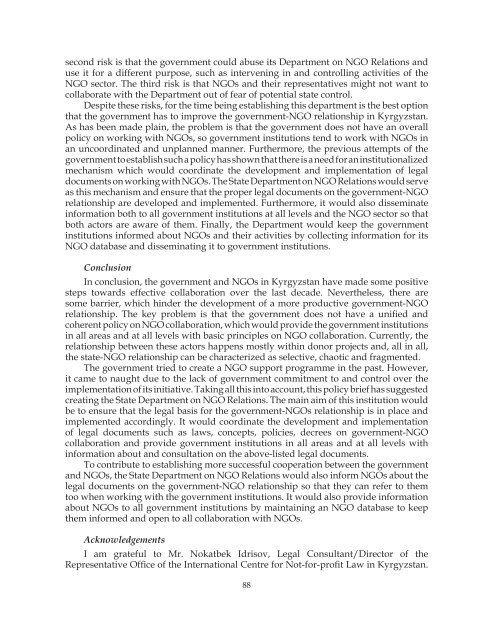KYRGYZSTAN TODAY Policy briefs on - Department of Geography
KYRGYZSTAN TODAY Policy briefs on - Department of Geography
KYRGYZSTAN TODAY Policy briefs on - Department of Geography
Create successful ePaper yourself
Turn your PDF publications into a flip-book with our unique Google optimized e-Paper software.
sec<strong>on</strong>d risk is that the government could abuse its <strong>Department</strong> <strong>on</strong> NGO Relati<strong>on</strong>s and<br />
use it for a different purpose, such as intervening in and c<strong>on</strong>trolling activities <strong>of</strong> the<br />
NGO sector. The third risk is that NGOs and their representatives might not want to<br />
collaborate with the <strong>Department</strong> out <strong>of</strong> fear <strong>of</strong> potential state c<strong>on</strong>trol.<br />
Despite these risks, for the time being establishing this department is the best opti<strong>on</strong><br />
that the government has to improve the government-NGO relati<strong>on</strong>ship in Kyrgyzstan.<br />
As has been made plain, the problem is that the government does not have an overall<br />
policy <strong>on</strong> working with NGOs, so government instituti<strong>on</strong>s tend to work with NGOs in<br />
an uncoordinated and unplanned manner. Furthermore, the previous attempts <strong>of</strong> the<br />
government to establish such a policy has shown that there is a need for an instituti<strong>on</strong>alized<br />
mechanism which would coordinate the development and implementati<strong>on</strong> <strong>of</strong> legal<br />
documents <strong>on</strong> working with NGOs. The State <strong>Department</strong> <strong>on</strong> NGO Relati<strong>on</strong>s would serve<br />
as this mechanism and ensure that the proper legal documents <strong>on</strong> the government-NGO<br />
relati<strong>on</strong>ship are developed and implemented. Furthermore, it would also disseminate<br />
informati<strong>on</strong> both to all government instituti<strong>on</strong>s at all levels and the NGO sector so that<br />
both actors are aware <strong>of</strong> them. Finally, the <strong>Department</strong> would keep the government<br />
instituti<strong>on</strong>s informed about NGOs and their activities by collecting informati<strong>on</strong> for its<br />
NGO database and disseminating it to government instituti<strong>on</strong>s.<br />
C<strong>on</strong>clusi<strong>on</strong><br />
In c<strong>on</strong>clusi<strong>on</strong>, the government and NGOs in Kyrgyzstan have made some positive<br />
steps towards effective collaborati<strong>on</strong> over the last decade. Nevertheless, there are<br />
some barrier, which hinder the development <strong>of</strong> a more productive government-NGO<br />
relati<strong>on</strong>ship. The key problem is that the government does not have a unified and<br />
coherent policy <strong>on</strong> NGO collaborati<strong>on</strong>, which would provide the government instituti<strong>on</strong>s<br />
in all areas and at all levels with basic principles <strong>on</strong> NGO collaborati<strong>on</strong>. Currently, the<br />
relati<strong>on</strong>ship between these actors happens mostly within d<strong>on</strong>or projects and, all in all,<br />
the state-NGO relati<strong>on</strong>ship can be characterized as selective, chaotic and fragmented.<br />
The government tried to create a NGO support programme in the past. However,<br />
it came to naught due to the lack <strong>of</strong> government commitment to and c<strong>on</strong>trol over the<br />
implementati<strong>on</strong> <strong>of</strong> its initiative. Taking all this into account, this policy brief has suggested<br />
creating the State <strong>Department</strong> <strong>on</strong> NGO Relati<strong>on</strong>s. The main aim <strong>of</strong> this instituti<strong>on</strong> would<br />
be to ensure that the legal basis for the government-NGOs relati<strong>on</strong>ship is in place and<br />
implemented accordingly. It would coordinate the development and implementati<strong>on</strong><br />
<strong>of</strong> legal documents such as laws, c<strong>on</strong>cepts, policies, decrees <strong>on</strong> government-NGO<br />
collaborati<strong>on</strong> and provide government instituti<strong>on</strong>s in all areas and at all levels with<br />
informati<strong>on</strong> about and c<strong>on</strong>sultati<strong>on</strong> <strong>on</strong> the above-listed legal documents.<br />
To c<strong>on</strong>tribute to establishing more successful cooperati<strong>on</strong> between the government<br />
and NGOs, the State <strong>Department</strong> <strong>on</strong> NGO Relati<strong>on</strong>s would also inform NGOs about the<br />
legal documents <strong>on</strong> the government-NGO relati<strong>on</strong>ship so that they can refer to them<br />
too when working with the government instituti<strong>on</strong>s. It would also provide informati<strong>on</strong><br />
about NGOs to all government instituti<strong>on</strong>s by maintaining an NGO database to keep<br />
them informed and open to all collaborati<strong>on</strong> with NGOs.<br />
Acknowledgements<br />
I am grateful to Mr. Nokatbek Idrisov, Legal C<strong>on</strong>sultant/Director <strong>of</strong> the<br />
Representative Office <strong>of</strong> the Internati<strong>on</strong>al Centre for Not-for-pr<strong>of</strong>it Law in Kyrgyzstan.<br />
88
















